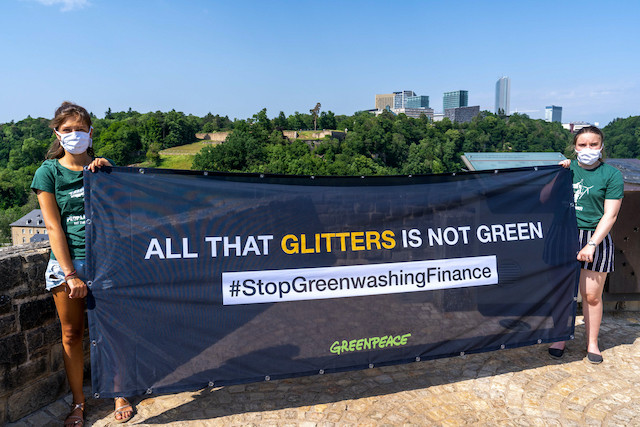Greenpeace on 21 June released a study analysing 51 sustainable funds available in Luxembourg and Switzerland. Compiled by Swiss consultancy Inrate, the report studied the capital allocation of these funds, whether they manage to amass more money for sustainable activities than conventional investment products.
“It is obvious for us that the financial sector has a special responsibility,” said Greenpeace campaigner Martina Holbach during a press conference. “We have this unique opportunity to steer money into the right channels,” she said about investments in the green transition.
Inrate in its study looked at the funds’ ESG impact score, carbon intensity, revenue derived from critical activities and major environmental controversies implicating companies that the sustainable funds invest in.
“The sustainability funds in the study hardly channelled more capital towards sustainable economic activities,” the study concluded. While the funds avoided some specific activities, such as defence, and redirected money away from controversy, they were “not effective in terms of climate and sustainability portfolio improvements.”
Asset managers were more selective in areas of “higher reputation or transitional risks and/or concerning issues that are rather easy to measure,” the report said. But it also said the failure to do more could be linked to a lack of comprehensive ESG data available to asset managers rather than deliberately misleading investors on green credentials.
“Financial market participants need reliable information to invest sustainably as well as to help them comply with their own disclosure obligations,” the finance ministry said in a statement about the report’s findings.
The EU is working on addressing “availability, consistency and reliability of sustainability data” through legislation such as the EU taxonomy, the sustainable finance disclosure regulation and the recent proposal for a corporate sustainability reporting directive, it said.
“Luxembourg has also been a pioneer when it comes to efforts to increase transparency and access to information on the sustainable nature of investments, notably through Luxflag, an independent labelling agency, as well as the Luxembourg Green Exchange, including the LGX Data Hub” the ministry said further. “Luxembourg thus fully supports the development of clear and coherent standards and definitions with regards to sustainable activities.”
The Inrate study did not specifically look into funds with a Luxflag or other labels and what difference this makes in terms of impact. It also did not differentiate between active and passive funds and did not investigate how investors are using active ownership to change companies they pour money into.
But Holbach questioned the green track record of Luxembourg’s financial centre based on the study, saying the emphasis was on the quantity of green products available rather than a quality check on the results these achieve.
She also said the EU’s taxonomy, which aims to set standards on what is considered green, is insufficient as it doesn’t effectively include social criteria and has become a tool subject to political squabbles between EU countries and lobby groups.
“On the whole, it can be said of the entire investment volume in the Luxembourg investment fund sector, only a small niche of around 4% are so-called sustainable funds,” Holbach said, adding that Luxembourg’s sustainable finance strategy fails to set clear, measurable targets on how to increase this amount.
Finance minister Pierre Gramegna (DP) and environment minister Carole Dieschbourg (déi Gréng) in February unveiled Luxembourg’s sustainable finance strategy. The strategy is built around awareness-raising and helping financial sector players carry out climate analyses.
Greenpeace in anticipation of the strategy's release had dubbed the effort to crowd-in the private sector based on voluntary commitments inadequate. The organisation renewed calls for more stringent, measurable targets with the release of the June study.
A January report also by Greenpeace had shown that the 100 biggest investments funds domiciled in Luxembourg by far exceeded their carbon emissions budget to rein in global warming.
The finance ministry at the time criticised the study’s methodology for including only equity funds and ignoring environmental, social and governance commitments and active shareholder engagement by some of the largest asset managers.
“Luxembourg is fully committed to the UN Agenda 2030 as well as the Paris Agreement, and more specifically supports the green transition of the financial sector in Europe and beyond,” the ministry said in January.
Nicolas Mackel, CEO of Luxembourg for Finance, said it was not a “workable avenue” to mandate funds to invest in more sustainable assets and that the transformation of the financial centre would take time.
But time is running out, Greenpeace said on Monday, with barely nine years left to reduce carbon emissions by 55% to meet a 2030 goal.
